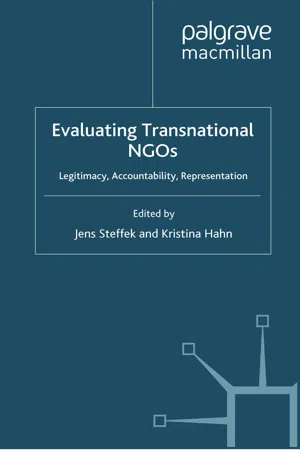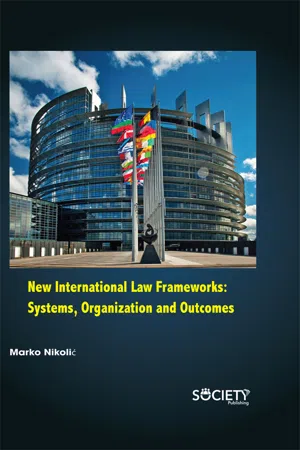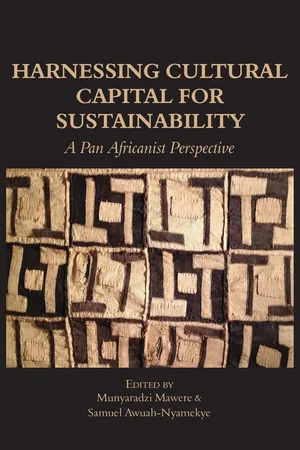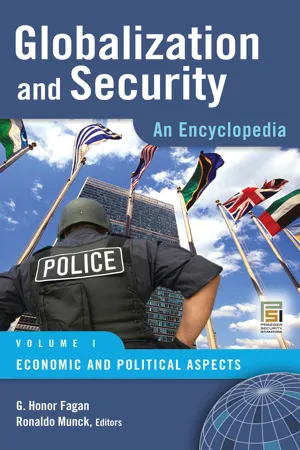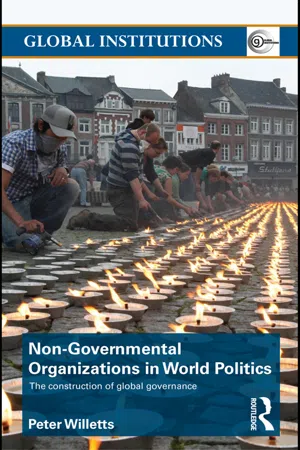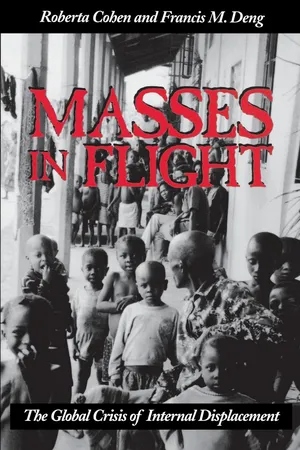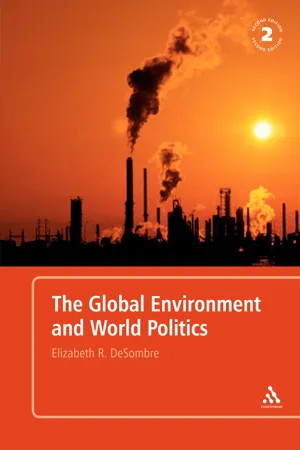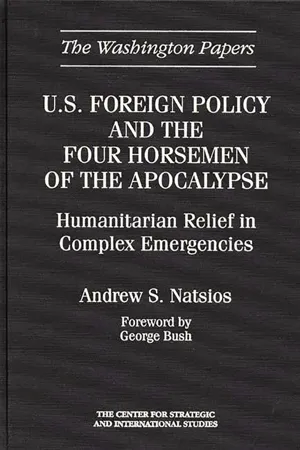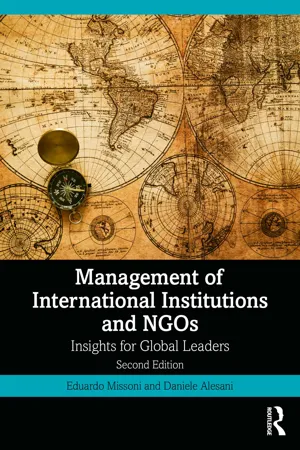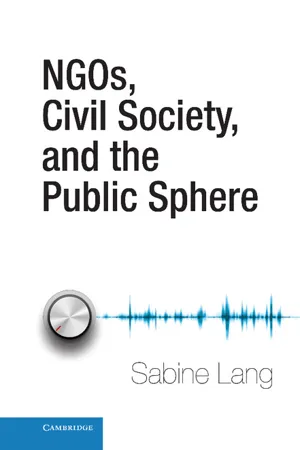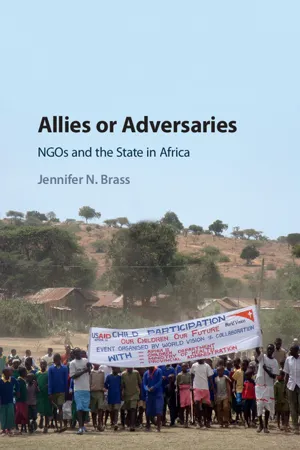Politics & International Relations
NGOs
NGOs, or non-governmental organizations, are independent, non-profit entities that operate without government control. They often focus on humanitarian, environmental, or social issues, providing aid, advocacy, and services to communities in need. NGOs play a significant role in global governance, influencing policies, providing expertise, and serving as a bridge between citizens and governments.
Written by Perlego with AI-assistance
Related key terms
1 of 5
12 Key excerpts on "NGOs"
- eBook - PDF
Evaluating Transnational NGOs
Legitimacy, Accountability, Representation
- J. Steffek, K. Hahn, J. Steffek, K. Hahn(Authors)
- 2010(Publication Date)
- Palgrave Macmillan(Publisher)
This is due to the fact that at that time, countless non-governmental organisations (NGOs) entered the stage of world politics. The occurrence of NGOs in international relations derives from a set of developments. Not only has the number of NGOs grown tremendously over the last decades, but they have also become more visible and gained in standing on the domestic as well as on the international level (Heins, 2008, p. 2). In addition, the social and political functions of NGOs as well as their political roles and what is expected of them has changed (Demirovic, 1996, p. 3). NGOs were, for example, invited to take part in the series of world conferences organised by the United Nations in the 1990s (Clark et al., 1998). In this setting, they were allowed to communicate their views to governmental delegations. Furthermore, NGO representa- tives spoke in the formal setting. Both, of course, aimed at convincing political actors of their point of view. In the following years, NGOs were increasingly invited to take part in international negotiations such as 184 Representing the People? the conferences of the parties of international regimes (Willets, 1996). In the early 1990s, International Relations scholars documented the work of the NGOs and demonstrated that NGOs were not only impor- tant actors in development cooperation, but also in the human rights sector or environmental policy. Several case studies illustrated NGOs’ work and stated that they were influential both in norm building as well as norm implementation processes (for example Clark, 1995; Gordenker and Weiss, 1995). The NGO-literature offers two different explanations for the emergence of the new actors in international relations. One strand of literature argues that the more encompassing inclusion of NGOs in formerly inter- governmental negotiations results from globalisation. According to this strand of argument, globalisation processes contribute to the proliferation of transnational problems. - Marko Nikoli?, Marko Nikolić(Authors)
- 2020(Publication Date)
- Society Publishing(Publisher)
Activities of NGOs are not limited. They include social, environmental, advocacy as well as human rights work. They can work in order to promote political or social change on a wide scale or very locally. NGOs play a vital role in improving communities, developing society, and promoting citizen participation (Figure 7.1). Non-Governmental Organizations and International ... 183 Figure 7.1. NGOs are an important part for the upliftment of society. Source: Image from Kunsan Air Base. In international law, this “non-status” of NGOs may be considered as an opportunity for maintaining a variety of voices of civil society globally. Various kinds of societal actors may be given the opportunity to contribute to the political process when they would otherwise be excluded, since the criteria for actor NGOs are not correctly regulated. However, this non-status also creates various difficulties. Most importantly, the lack of regulation raises questions about NGO representatively and legitimacy in the light of the increasing participation of NGOs in international political processes.’ Whom do NGOs actually stand for? Who authorizes NGOs to represent what sort of views? Many well-known non-profit organizations such as the WWF, Amnesty International, or CARE, can claim to have a large membership or supporters from different parts of the world; there are many other NGOs which are instead simply self-appointed, some of them involve only a small group of people (or even a single individual) and represent the opinions of a relatively small number of people. In this modern era, NGOs are a visible as well as active part of an international life. They promote a wide range of aims as well as goals. They also work in a large variety of areas.- eBook - PDF
Harnessing Cultural Capital for Sustaina
A Pan Africanist Perspective
- Munyaradzi Mawere, Samuel Awuah-Nyamekye, Munyaradzi Mawere, Samuel Awuah-Nyamekye(Authors)
- 2015(Publication Date)
- Langaa RPCIG(Publisher)
It further explores the complexities and politics that define the involvement of NGOs in the development equation and quest for sustainability in rural communities in Zimbabwe as elsewhere in Africa. 137 Understanding NGOs Non-governmental organisations (NGOs) are not easy to define such that the term ‘NGO’ itself is rarely used with consistence due to differences in their level of operation (i.e. whether local, national or international) and orientation (i.e. the types of activities it takes on) (Vakil 1997). The term NGO was first coined in 1945 when an inter-governmental organisation, the United Nations (UN) was formed (Davies 2014a). The UN approved and made possible the existence of specialised international non-states agencies such as NGOs to be awarded observer status at its assemblies and some of its meetings. It is only after this incident that the word NGO became widely used to refer to any non-profit, voluntary citizens’ groups which are organised on a local, national or international level are task oriented and driven by people with a common interest (Ibid). For the World Bank (1996: 4), NGOs “are private organisations that pursue activities to relieve suffering, promote the interests of the poor, protect the environment, provide basic social services, or undertake community development.” Diverse as human interests themselves, NGOs are highly diverse engaging in a wide range of activities. By their very nature, NGOs are neither part of a government nor meant for profit making such as they perform a variety of service and charitable or humanitarian functions including advocating and monitoring policies and encourage people participation in issues affecting their lives such as politics, health, education, religion, environment, development, climate change, and business-related activities, through provision of information. - eBook - PDF
Globalization and Security
An Encyclopedia [2 volumes]
- G. Honor Fagan, Ronaldo Munck, G. Honor Fagan, Ronaldo Munck(Authors)
- 2009(Publication Date)
- Praeger(Publisher)
It is important to understand that NGOs are nonstate actors, but not all nonstate actors are NGOs. One popular international relations textbook notes two types of NGOs: re- ligious organizations and multinational corporations (Rourke 1998, 66–68), neither of which would be considered NGOs in other circles. Some also use it interchangeably with the term ‘‘civil society.’’ The term ‘‘civil society,’’ however, refers to the broad sphere of public activity that lies between the individual, the state, and the corporations. ‘‘One of the problems with using the term today is that ‘civil society’ traditionally encompassed everything from the family to the church to the business corporation’’ (Frumkin 2002, 13). The broad usage is also reflected in the United Nations’ definition, in which transnational actors may be accepted as NGOs. According to the UN Economic and Social Council’s (ECOSOC) definition, ‘‘Any international or- ganization which is not established by inter-governmental agreement shall be considered as an NGO.’’ The only constraints are that an NGO cannot be profit making; it cannot advocate the use of violence; it cannot be a school, a university, or a political party; and any concern with human rights must be general, rather than restricted to a particular communal group, nationality, or country. Following are some other definitions offered by scholars: 1. Robert Gorman (1984, 2) defines NGOs as ‘‘non-governmental (private), tax-exempt, nonprofit agencies engaged in overseas provision of services for relief and development purposes. They also derive at least a portion of their funds from private, charitable donations.’’ 2. Historian Akira Iriye (1999, 422) defines NGOs as ‘‘voluntary and open associations of individuals outside of the formal apparatus of the state that are neither for profit nor engage in political activities as their primary objective.’’ 3. - eBook - ePub
Non-Governmental Organizations in World Politics
The Construction of Global Governance
- Peter Willetts(Author)
- 2010(Publication Date)
- Routledge(Publisher)
5 Understanding the place of NGOs in global politicsHaving established the importance of non-governmental organizations in politics, law, and communications at the global level, we will now consider how NGOs and their activities can be accommodated in our theoretical understanding of global politics. Most of the literature in the academic discipline of international relations is biased towards the study of “states,” neglecting both non-governmental organizations and international organizations. This is based on an assumption that the domestic politics of individual countries is different in nature from international politics. Those who assert there are similarities between politics at all levels of analysis prefer to identify themselves with a pluralist approach, also known as the multicentric approach. This position is signaled in this book and by other pluralist writers, by replacing references to “international relations” with “world politics” or “global politics.”This first part of this chapter outlines a very brief sketch of the four competing approaches to theoretical analysis, in order to demonstrate the need for pluralism. The second part is a full discussion of the structural question, what actors do we study? This starts with an argument that we need to analyze governments and societies rather than states, in order to allow room for consideration of transnational NGOs and transnational companies. It continues by distinguishing the five main ways in which transnational actors combine in global networks to strengthen their political position and to form global coalitions. Then we will examine the advantages and disadvantages of regime theory for analyzing policy-making within all types of international organizations, concluding that regime theory needs to recognize the participation of NGOs in the politics of international regimes.The third part of this chapter covers the nature of global political processes. It is necessary to change from a focus on power as possession of military and economic capabilities to power as the exercise of influence. It is also necessary to replace the traditional distinctions between high politics and low politics and between interests and values with a wider awareness of the many values, beyond security and wealth, that actors pursue. Then, with an issue-based constructivist analysis, we can move from merely providing interesting descriptions of NGOs to having a theoretical basis for saying NGOs exercise power in global politics. They are crucial agents in the movement of ideas. The fundamental dynamics of political change are the ways in which persuasion, socialization and institutionalization lead to change in the predominant norms. NGOs gain influence by framing debates and linking their values to the concerns of other actors. - eBook - PDF
Masses in Flight
The Global Crisis of Internal Displacement
- Roberta Cohen, Francis M. Deng(Authors)
- 2012(Publication Date)
- Brookings Institution Press(Publisher)
3 NGOs are now the second largest source of relief and de-velopment assistance after bilateral governmental donors. 4 They are also the main implementing partners of UN agencies in emergency situations, directly delivering humanitarian assistance, setting up water and sanita-tion systems, offering a modicum of protection, and providing reintegra-tion and development support. By voicing their concerns through the media and playing advocacy roles with governments and intergovernmen-tal organizations, international NGOs have become an important politi-cal force. Some twenty international NGOs in the United States and twenty in Europe are sufficiently involved in complex emergencies to have a sub-stantial impact on the ground. 5 Of these, perhaps ten U.S. and another ten European NGOs receive seventy-five percent of all the public funds spent by NGOs in complex emergencies. 6 The annual budgets of some of the major international NGOs are now close to the $500 million mark. 7 In third world countries with ineffective or nonfunctioning governments, international NGOs have sometimes assumed responsibility for running vital public institutions and services. But as NGOs have become more involved in internal conflicts and situations of internal displacement, their weaknesses and shortcomings have also become evident. 8 Their activities are frequently uncoordinated. They may espouse broad humanitarian principles, but the services of some may target one religious or ethnic group over another. NGO assis-tance may also inadvertently prolong conflicts by permitting belligerents to continue fighting while their civilian populations are cared for by the international community. Moreover, their increasing dependence on gov-ernmental funding may compromise their independence and freedom of action. - eBook - PDF
- Elizabeth R. DeSombre(Author)
- 2007(Publication Date)
- Continuum(Publisher)
A useful way to categorize these less- traditional forms of avenues for non-state actor influence is to look at those as acting within the state system but not through states, and those acting internationally in ways that circumvent the state system. 86 The Global Environment and World Politics Environmental organizations can act within the state system without acting within states per se. Doing so may be as simple as working to raise awareness in a different state of an environmental issue in a way that inspires people to take action to get their own state to address the issue internationally. In addition, NGOs have come to play roles as critics or informants during the process of negotiation of international agreements. More and more frequently NGOs are allowed, if not to participate in, at least to observe, international negotiations. They are often allowed to speak in meetings when recognized by the chair, and interact with delegates in the hallways and coffeebreaks where some of the most important details of an impending agreement are discussed. Sometimes they help draft elements of what eventually becomes the treaty. In the negotiation of the Basel Convention on the Control of Transboundary Movements of Hazardous Wastes and their Disposal, for instance, both Greenpeace and the Center for Science and the Environment drafted some of the language that ultimately ended up in the text of the treaty. 29 The participation of environmental organizations in the delegations of national representatives to international organizations may be considered part of the conventional activity of NGOs. In some contexts, however, environmental activists have taken this approach one step further, by essentially representing states in international fora. - eBook - PDF
U.S. Foreign Policy and the Four Horsemen of the Apocalypse
Humanitarian Relief in Complex Emergencies
- Andrew S. Natsios(Author)
- 1997(Publication Date)
- Praeger(Publisher)
6 In spite of their nonprofit nature, NGOs need to compete with each other, though perhaps less so than private businesses do. The quality of their field programs affects their capacity to attract government grants, and their public visibility affects their private contributions. American NGOs thus can profoundly influence the policy- making process of the U.S. government through their marketing, fund-raising, field operations, development education, and advo- cacy efforts with Washington policymakers. Typology NGOs as a group are as unlike as they are similar. They form a mosaic of enormous diversity, a tapestry of rich color and variety. Their organizational structures, their philosophical approach to relief and development and public policy, their sectoral specializa- tion, and their historical roots cover such a wide spectrum that NGOs cannot be easily characterized unless they are subdivided into smaller subsets. Those NGOs that work exclusively on public policy issues and have no permanent operational presence in the field are known as advocacy groups. Advocacy groups tend to have mod- est budgets and staffs and few, if any, field programs or projects; instead, they conduct research on issues such as human rights abuses, refugee protection, the environment, health, or hunger. 64 Humanitarian Relief in Complex Emergencies Their mandate is to influence the policy debate in their area of expertise, not to run relief or development programs. A few have mailing lists in the 50,000-person range, but most enjoy a modes t base of support among the general public. Conversely, the pri- mary focus of operational NGOs is managing projects in the field, although most of them also do advocacy work, increasingly so over the pastfiveor six years. Each category of NGO has its strengths and weaknesses. Advocacy NGOs sometimes suffer from a limited understanding of realities in the developing world because they lack a permanen t presence in the field. - eBook - PDF
- Math Noortmann, August Reinisch, Cedric Ryngaert, Math Noortmann, August Reinisch, Cedric Ryngaert(Authors)
- 2015(Publication Date)
- Hart Publishing(Publisher)
22 10.3 NGO ROLES: A SOCIO-POLITICAL-LEGAL APPROACH Many textbooks on international law describe the formal and legal role of non-governmental organizations … as limited, or do not discuss NGOs in legal terms at all. … it should be noted that the most important role of NGOs at the international level is probably outside the strictly legal arena. 23 While Anna-Karin Lindblom’s observation with respect to the descriptive and empirical approach of our episteme is correct, her qualified conjec-ture, unfortunately, reinforces the memento and the (mis)conception of NGOs in international law, that has been so prevalent in our discourses. 24 Only if we were able to hermetically distinguish between social, politi-cal and legal spaces, between non-permeable private and public spaces, or between national, international, transnational and global levels of partici-pation, could we arguably study international law in isolation and exclude all actors that do not sign international treaties as defined by Article 2(1) of the 1968 Vienna Convention on the Law of Treaties (VCLT). 25 In the absence of clear analytical and conceptual distinctions in this respect, we must consider states and non-state actors to straddle different spaces, spheres and levels of participation. Over recent decades, the number of NGOs has increased and their par-ticipation in the social, political and legal space(s) of international affairs has become more visible. Most observers point critically towards (1) the ‘increasing popularity of NGOs with governments and official aid agen-cies’ and (2) the ‘increasing availability of increased funding’. 26 This popu-larity, according to Moore, is ‘driven by two basic sets of beliefs organised 22 The absence of enforcement and implementation mechanisms is not significant for the determination of existing rights or obligations. - eBook - ePub
Management of International Institutions and NGOs
Insights for Global Leaders
- Eduardo Missoni, Daniele Alesani(Authors)
- 2023(Publication Date)
- Routledge(Publisher)
2 International non-governmental organizations Definitions, classification, and relation with the UN system Eduardo MissoniDOI: 10.4324/9781003289852-32.1 Defining NGOs
The generic term of international organizations (IOs) is often used in reference to both international institutions – which we tried to define and classify in the previous chapter – and a growing number of non-profit entities with member organizations from different countries. The latter have been often defined as international non-governmental organizations (INGOs), though their legal nature, purpose, organization, and role are far from uniform.In the case of international institutions, the characteristics of their membership and of the relations between their members are implicit in the definition. International institutions are established new intergovernmental juridical entities, with their own governance and management structures, created through formal agreements among member states, and represented by their governments; thus, relations among them are truly inter-national.1 On the contrary, in the case of INGOs a clear, unambiguous, and theoretically acceptable definition remains to be formulated.Both the concept of “non-governmental” and “international” need to be further defined to circumscribe our field of interest. As we will see, the widely used term non-governmental organization (NGO) is itself an essentially contested concept (Willets 2011 ) and is often used as a synonym for “non-profit”, “civil society”, or “third sector” organization.Although the attribute “international” is commonly used referring to INGOs, an organization associating non-state actors (NSAs ) based in multiple countries would be more precisely referred to as trans-national2 or multinational, i.e., subjects operating and linking with others beyond the borders of one nation, or with presence in more than one country. From a juridical standpoint, INGOs are not subjects of international law, although international agreements, conventions, and protocols may refer to them and bestow them specific rights and obligations. For example, workers’ and employers’ organizations enjoy special protection under the International Labour Organization conventions and some international and regional treaties recognize the capacity of NGOs to be party before various courts, tribunals, and bodies. Rights and obligations are also bestowed on a number of NGOs under international humanitarian law. The special status of the International Committee of the Red Cross, which is predominantly non-governmental in character, demonstrates the ability of international law to encompass NGOs (Lindblom 2011 - eBook - PDF
- Sabine Lang(Author)
- 2012(Publication Date)
- Cambridge University Press(Publisher)
These changes took hold at all levels of government; however, local and transnational political institutions in particular have, while externalizing state or organization functions and program tasks, provided space for nongovernmental organizations to meet and provide input under the umbrella of formal governance bodies (Alvarez 1999; Reimann 2006; Steffek and Hahn 2010). Finally, engagement and communication patterns among baby boom- ers have changed in ways that favor NGOs over political parties and traditional interest groups while exposing more fluid, single-issue, and networked mobilization patterns (Lipschutz 1996; Bennett 1998, 2004; Bimber 2003; Flanagin and Stohl 2009). The majority of post-1960s NGOs seem to be better positioned to feed off, and in turn charge, these different social engagement patterns than traditional interest groups (Skocpol 1999a). Yet, although the sector grows in size and seems to gain legitimacy as a major influence on political decision-making processes, governments or governance institutions do not always or unequivocally like the guests that they have invited to the table. ngo tropes The stories that make the headlines tend to zoom in on the adversarial role of NGOs vis- ` a-vis governments. Here are some snapshots of how contentious NGO–government relations appear to be across the globe: 16 NGOs, Civil Society, and the Public Sphere In Australia, the Howard government instituted a “gag clause” that prevented NGOs that received government funding from discussing their programs without prior government approval (Edgar 2008). In 2008, the successor government reinstituted freedom of speech for the NGO sector. In Ethiopia, the Civil Society Organization Law of 2009 prohibited any domestic NGO that received more than 10 percent of its funding from abroad from engaging in activities related to “the advancement of human and democratic rights . - eBook - PDF
Allies or Adversaries
NGOs and the State in Africa
- Jennifer N. Brass(Author)
- 2016(Publication Date)
- Cambridge University Press(Publisher)
As a result of government–NGO collaboration on service provision, the total amount of services provided was likely higher than it would have been in NGOs’ absence (2008–38). Indeed, NGOs have had a distinct positive impact on policymaking and service provision capacity. NGOs: (a) contributed to policymaking at the national, subnational, and local levels; (b) provided indirect services that the government was not able to provide; (c) extended the arm of the state to additional places and locations for which government counterparts 15 Other hotels were more reasonable. For example, in the same period, I stayed in a tidy little hotel that also held frequent NGO seminars. The rooms were approximately $15 per night and meals were $1 to $5. 150 NGOs’ role in governance lacked sufficient funds; and (d) worked collaboratively with government on programs neither could do alone. In providing such services, NGOs and government both saw the role of the organizations as gap filling, complementing, or supplementing the state. As a Nigerian scholar confirmed elsewhere in the continent, “Any expectation that the NGOs will supplant the state in service provision is likely to be utopian” (Obiyan 2005, 302). Instead, NGOs in Kenya expanded the nature of state service provision such that nongovernmental as well as governmental actors began to operate under the aegis of “the state.” Working hand in hand on programs and projects, the line between public agency and private NGO blurred. Government civil servants spent months paid by and working for NGO programs. NGOs set up their district or regional offices in government ministry buildings, with public and NGO employees working literally side by side. As elaborated in the conclusion to this book, this trend is not particular to Kenya. In Brazil, nongovernmental actors help government actors do their jobs, activating both civil society and government actors (Abers and Keck 2009, 291).
Index pages curate the most relevant extracts from our library of academic textbooks. They’ve been created using an in-house natural language model (NLM), each adding context and meaning to key research topics.
